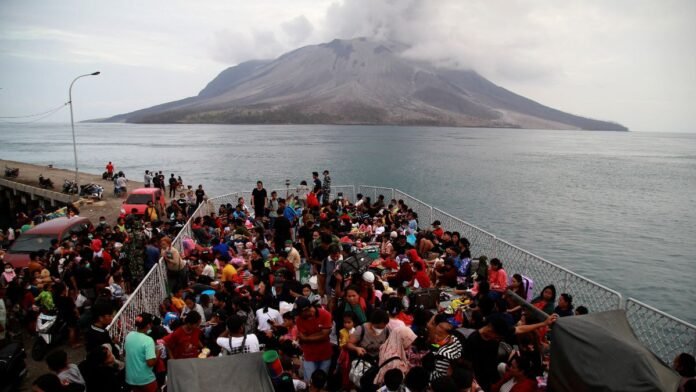Mount Ruang, located in Indonesia, erupted spectacularly last month, spewing ash that forced nearby airports to close and resulted in cancelled flights. The volcanic activity has raised concerns about the safety of the surrounding communities, prompting authorities to take action to protect residents from the potential threat posed by the eruption.
In response to the volcanic activity, Indonesian authorities have announced plans to relocate the entire population of an island located near Mount Ruang. The decision to evacuate the island comes amid fears that continued volcanic activity could pose a risk to the safety and well-being of residents.
The relocation effort is aimed at ensuring the safety of the island’s inhabitants in the face of the volcanic threat. Authorities are working to establish temporary shelters and provide assistance to residents as they prepare to leave their homes and move to safer areas.
The decision to relocate the island’s population underscores the seriousness of the volcanic threat posed by Mount Ruang. With the volcano continuing to exhibit signs of activity, authorities are taking proactive measures to mitigate the risk to human life and property.
The eruption of Mount Ruang serves as a reminder of the unpredictable and potentially devastating impact of volcanic activity. Volcanic eruptions can result in widespread destruction, including the release of ash, lava flows, and pyroclastic flows, posing significant risks to nearby communities.
Indonesia, located along the Pacific Ring of Fire, is prone to volcanic eruptions and earthquakes due to its location on tectonic plate boundaries. The country is home to numerous active volcanoes, and volcanic activity is a constant threat to the safety and security of its residents.
In the face of ongoing volcanic activity, Indonesian authorities are working to monitor Mount Ruang and assess the potential risks to surrounding communities. The decision to relocate the island’s population is part of a broader effort to ensure the safety and well-being of residents in the event of a volcanic eruption.
The decision to relocate the entire population of an island near Mount Ruang is a complex undertaking that requires careful planning and coordination. Indonesian authorities are faced with the challenge of ensuring the safety and well-being of residents while also addressing logistical and infrastructure challenges associated with the relocation effort.
One of the primary concerns surrounding the relocation is the availability of adequate housing and facilities for the displaced population. Authorities must work quickly to establish temporary shelters and provide basic amenities such as food, water, and medical care to meet the immediate needs of evacuees. Additionally, efforts must be made to ensure that the relocation process is conducted in a dignified and respectful manner, taking into account the cultural and social considerations of the affected communities.
In addition to providing immediate assistance to evacuees, Indonesian authorities are also working to develop long-term plans for the resettlement of the island’s population. This may involve identifying suitable relocation sites and implementing infrastructure projects to support the new communities. It is essential that these efforts are conducted in consultation with local residents to ensure that their voices and concerns are heard throughout the relocation process.
The decision to relocate the island’s population highlights the challenges of living in volcanic and geologically active regions. While volcanic eruptions are a natural phenomenon, they can have significant and far-reaching impacts on the communities and ecosystems located near active volcanoes. In Indonesia, where millions of people live in close proximity to active volcanoes, volcanic activity is a constant threat that requires careful monitoring and preparedness measures.
Indonesian authorities have a wealth of experience in managing volcanic risk, given the country’s extensive history of volcanic activity. In recent years, the Indonesian government has invested in monitoring and early warning systems to help detect signs of volcanic unrest and provide timely alerts to at-risk communities. These efforts have helped to reduce the impact of volcanic eruptions and improve the overall resilience of communities living near active volcanoes.
Despite these measures, volcanic eruptions remain a significant hazard in Indonesia, and the eruption of Mount Ruang serves as a stark reminder of the ongoing threat posed by volcanic activity. As the relocation effort gets underway, Indonesian authorities are working tirelessly to ensure the safety and well-being of the affected population. By taking proactive measures to address the risks associated with volcanic activity, Indonesia is working to build a more resilient and secure future for its people in the face of natural hazards.

